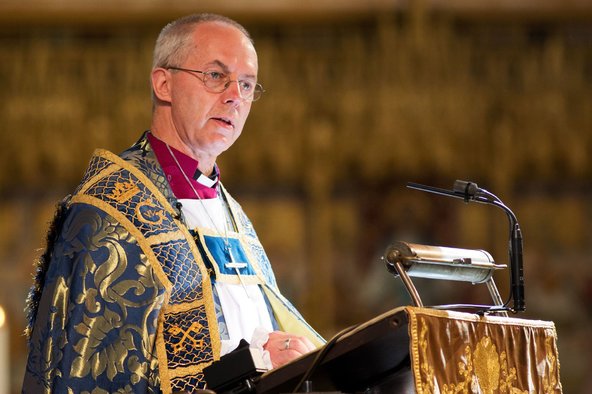 Pool photo by Jack HillJustin Welby, the archbishop of Canterbury, urged a bank split.
Pool photo by Jack HillJustin Welby, the archbishop of Canterbury, urged a bank split.
The archbishop of Canterbury, a former chancellor of the Exchequer and the outgoing governor of the Bank of England are unusual comrades in arms.
Yet, the three stalwarts of the British establishment — Justin Welby, Nigel Lawson and Mervyn King — are all calling for the breakup of the part-nationalized Royal Bank of Scotland.
They are part of a growing debate in Britain about what to do with the bank and its rival, the Lloyds Banking Group, which received more than $103 billion combined in rescue bailouts during the financial crisis.
Now, nearly five years after British taxpayers first took stakes in the lenders, the government is preparing to reduce its holdings before the next general election, which is expected in early 2015. The government owns 81 percent of R.B.S. and 39 percent of Lloyds.
Yet, unlike the share sales in financial giants like Citigroup that allowed the United States government to make a profit, the prospective offerings in Britain may be more difficult.
The two banks are still cleaning up their balance sheets and selling off unwanted assets that could put off new investors. Both continue to come under political pressure to increase potentially risky lending to the struggling British economy. And the timing of any share sale, which could come as early as next year, may lead to losses for British taxpayers — potentially angering voters.
“As we move closer to an election, the share prices of R.B.S. and Lloyds will become more scrutinized,” said Peter Hahn, a banking professor at the Cass Business School in London. “Whoever is in government, selling shares in these banks will be a top priority.”
Liz Morley, a representative for UKFI, the government agency that is in charge of managing the bank holdings, declined to comment for this article.
The British government’s quandary over the banks stands in contrast with the experience of the United States Treasury Department, which reduced the government’s stakes in the big banks more quickly.
Elisabeth Rudman, an analyst with the credit rating firm DBRS, said the two British banks were in much worse shape because of the financial crisis than their American counterparts. R.B.S. was not only burdened by its participation in the acquisition of the Dutch lender ABN Amro, but it had large exposure to imploding real estate markets like Ireland.
 Clive Brunskill/Getty Images and Issei Kato/ReutersNigel Lawson, left, the former chancellor of the Exchequer, and Mervyn King, the former Bank of England governor.
Clive Brunskill/Getty Images and Issei Kato/ReutersNigel Lawson, left, the former chancellor of the Exchequer, and Mervyn King, the former Bank of England governor.
The critical element in the British government’s effort to shed its banks stakes is timing. Later this month, George Osborne, the current chancellor of the Exchequer, will present his strategy to return the two banks to the private sector. His plan will come soon after the findings of a British parliamentary committee in the middle of June that will outline how the firms could be privatized. Lawmakers remain divided over how the banks’ should be privatized, with many of the committee members calling for the breakup of R.B.S. to carve out the most risky assets.
Those in favor of a split say that freeing R.B.S. from its worst-performing assets would allow the bank to lend more, strengthen the banking system and help Britain’s economic recovery. Those against the breakup argue that it would cost both time and money that would be better spent letting the bank continue with its planned overhaul.
To connect banks with local communities could involve “recapitalizing at least one of our major banks and breaking it up into regional banks,” Archbishop Welby, a former oil executive who sits on the parliamentary committee, said in a speech on April 21.
For Mr. Osborne, planning the offerings will be precarious.
If the British government sells its stakes too soon, it could book a loss that might not sit well with voters. But if the government waits too long to sell, it could deter potential investors from buying the shares. It also may reverse the firms’ recent share price rise that have made the banks’ stocks some of the best performers in the FTSE 100-stock index over the last 12 months.
“I get confused by all the talk about waiting,” said Ian Gordon, a banking analyst with Investec in London, adding that the British government should sell the stakes tomorrow. “Can we sell the shares now? Of course we can.”
The fortunes of the two British banks have certainly improved since they received multibillion-dollar bailouts.
R.B.S. has been gradually digging itself out of its ill-judged ABN Amro acquisition in 2007. The bank, based in Edinburgh, has shed billions of dollars from its balance sheet and cut around 40,000 jobs over the last five years. The firm has also trimmed its investment banking operations, which came under scrutiny this year after R.B.S. was forced to pay a $612 million fine connected to a rate-rigging scandal.
Lloyds, which already is Britain’s largest mortgage lender, has refocused its efforts on the British retail banking sector. The bank’s chief executive, António Horta-Osório, announced a £1.5 billion net profit in the first quarter of 2013, compared with a £5 million loss in the same period last year.
Analysts say the rise in earnings is mostly driven by cost reductions, a fall in delinquent loans and fast-tracked asset sales like the disposal of a portfolio of real estate-backed securities in the United States for £3.3 billion last month to a number of American investors, including Goldman Sachs.
Market participants are now centering their attention on when the British government will start to reduce it stakes.
R.B.S.’s chairman, Philip Hampton, has said the bank would like the British government to start selling shares from the middle of next year, though the firm’s current share price is around 35 percent below what British taxpayers paid for their holding. Lloyds’ stock price is slightly above the government’s so-called break-even point, though bankers caution that any offering will be dependent on the health of the broader financial markets.
“Bringing too many shares to market could easily scare off investors,” said a prominent investment banker at a rival firm in London, who spoke on the condition of anonymity because he was not authorized to speak publicly. “When it comes to reducing the government’s stake, timing will be everything.”
Some leading voices in Britain are also calling for restraint.
Alistair Darling, the former chancellor of the Exchequer who led the bailouts of R.B.S. and Lloyds, said the government would make a mistake if it were to rush a sale of shares before the next election. Mr. Darling, a Labour politician who opposes the breakup of R.B.S., said the current government could wait at least another 18 months before selling off its stakes, but must clarify its plans to avoid creating confusion with potential investors.
“A clear statement is needed,” Mr. Darling said. “The longer this drags on, the worse this is going to get.”
For any prospective share sale in the two banks to be a success, the British government must convince voters that the offerings would benefit the economy after taxpayers spent billions of dollars to rescue the two lenders.
Just outside an R.B.S. branch in central London on Thursday, many seemed unconvinced that privatizing the bank would help to jump-start Britain’s recovery.
“I can’t see it making much difference,” said Sarah Mulligan, an I.T. consultant on her way to a meeting in London’s financial district. “Changing who owns the banks won’t necessarily get them lending again.”
A version of this article appeared in print on 06/07/2013, on page B7 of the NewYork edition with the headline: Pressure in Britain Over What to Do With Bailed-Out Banks.
Article source: http://dealbook.nytimes.com/2013/06/06/pressure-in-britain-over-what-to-do-with-bailed-out-banks/?partner=rss&emc=rss